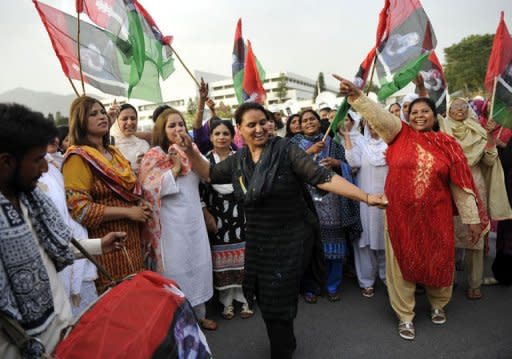Pakistan lawmakers elect new PM
MPs elected Raja Pervez Ashraf as Pakistan's new prime minister Friday, in a bid to end a crisis sparked by judges ousting the premier and demanding the arrest of his would-be successor. The national assembly rubber stamped Ashraf's appointment by 211 votes in the 342-member lower house of parliament, dominated by the main ruling Pakistan People's Party (PPP) and its fractious coalition members. "Raja Pervez Ashraf is declared to be elected as prime minister of the Islamic republic of Pakistan," speaker Fehmida Mirza announced. In his first speech to parliament shortly after the announcement, Ashraf, 61, called on Pakistani Taliban militants to lay down their arms. "The irresponsible behaviour of religious extremist has ruined Islam and Pakistan. I, as prime minister of Pakistan, appealed them to lay down arms and join the mainstream of life," he said. Pakistan says 35,000 people have been killed by terrorism in the country since the start of the US-led war on Al-Qaeda after the 9/11 attacks on the United States. Ashraf said his government would continue dialogue for peace with India and all other neighbouring countries including Iran and Afghanistan. He also promised to develop "cordial relations" with the United States, which have come under severe strain over the past year following a US raid that killed Al-Qaeda leader Osama bin Laden and a botched US air strike that left 24 Pakistani soldiers dead. "We will develop cordial relations with United States and international community on the basis of equal rights and dignity," he said. Islamabad shut its border to NATO supply convoys in Afghanistan after the November air strike and talks designed to reopen the routes have stalled. Washington so far has refused to issue a formal apology over the incident, instead expressing regret and offering condolences. Ashraf did not mention reopening the supply routes. The prime minister and his new cabinet of 27 ministers and 11 deputy ministers were later sworn in by President Asif Ali Zardari in a closely guarded ceremony at the presidency, state-run Pakistan television reported. Zardari will be hoping that Ashraf and his new cabinet will be able to see through the government's five-year term in office, due to expire in February 2013, without the need for early elections. But Ashraf is a controversial choice. Currently being investigated over a corruption case from his tenure as water and power minister, he has also been blamed for much of the government's inability to resolve a disastrous energy crisis. The change in premier is likely to ease little of Pakistan's myriad problems, not least appalling power cuts that enrage millions or the stalemate in US relations. Ashraf will also come under immediate pressure from the Supreme Court to write to Swiss authorities, asking them to reopen investigations into Zardari. The PPP government, dogged by corruption allegations, has been locked in a stand-off with the judiciary for years, accused of working behind the scenes with the military and the political opposition. Its culmination came on Tuesday when the Supreme Court unceremoniously evicted Yousuf Raza Gilani from the prime minister's office after convicting him of contempt for refusing to reopen Swiss corruption cases against Zardari. Two days later an anti-narcotics court ordered the arrest of Makhdoom Shahabuddin, Zardari's nomination to replace Gilani, over a drugs scandal. The question now remains when the next general election will be held. Ashraf promised to hold free, fair and transparent elections. The PPP won elections in 2008 ending nearly a decade of military rule and stands to become the first elected administration in Pakistan's history to complete its term in office and hand over to another elected government. Gilani's disqualification was the culmination of a showdown between the judiciary, led by a popular chief justice and a weak ineffective government, that critics say has been politicised at best, or vendetta-driven at worst. The cases against Zardari date to the 1990s, when he and his wife Benazir Bhutto, a former premier who was assassinated in 2007, are suspected of using Swiss banks to launder $12 million allegedly paid in bribes by companies seeking customs contracts. The Swiss shelved the cases in 2008 when Zardari became president.




